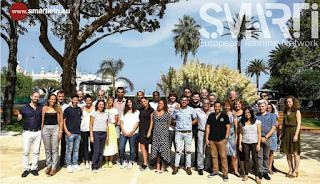Here I am!
Hi guys! I am Giulia and this is my PhD logbook. So, WELCOME ON BOARD!
 I live in Nottingham (United Kingdom) but I was born in Sicily in the south of Italy and precisely in Castelvetrano, a sunny town near the sea with the amazing archaeological site of Selinunte within its territory!
I live in Nottingham (United Kingdom) but I was born in Sicily in the south of Italy and precisely in Castelvetrano, a sunny town near the sea with the amazing archaeological site of Selinunte within its territory!
Palermo was my host city during my BSc degree period in Environmental Engineering at Universitá degli studi di Palermo. I love that city for the wonderful weather, the sea and the terrific food! Nevertheless, I decided to follow my passion for the geotechnics and thus I moved to the north of Italy to complete my study at Politecnico di Torino. I completed my MSc in Environmental Engineering (Geoengineering specialization) with a thesis on the “Influence of the conditioning on the wear on metallic parts in EPB tunnelling”. It was an experimental thesis carried out with the collaboration of laboratory “Tunnelling and Underground Space” of Polytechnic of Turin. This opportunity gave me the chance to get in touch with the research world for the first time and discovered myself fascinated from the opportunity to work and learn at the same time.

Indeed, after university I started a researching activity at the Institute of Environmental Geology and Geoengineering (IGAG) of the Italian National Research Council (CNR) in Turin. I undertook geological site investigations and laboratory procedures for the characterisation and qualification of rocks in excavation sites and tests on asphalt mixture.
I also joined the institute for the design and execution of geotechnical monitoring systems for the continuous and remote measurement of in-situ stress marble quarries based in Carrara. I enjoy working in CNR but it would have never pushed me to the goals I want to achieve for my career.
That’s why when I heard about the SMARTI ETN programme I didn’t hesitate to send the application for my project!
SMARTI ETN (Sustainable Multi-Functional Automated Resilient Transport Infrastructures) is a Marie Skłodowska-Curie European Training Network (ETN), founded by the European Union under the Horizon 2020 EU project, which gives to 15 fellows the opportunity to work in the research field combining academia and industry. What captured my attention the most was the opportunity to collaborate with a global successful company as AECOM.
My project “RaCoMo”, indeed, born as collaboration between AECOM and University of Nottingham. It’s part of SMARTI Work Package 2, called “SMARTI Prototypes”, which as the main objective of develop smart transportation infrastructures elements.
RaCoMo tries to understand how the performance of a railway infrastructure system is affected by earthwork deterioration, instability, distresses. Starting from incidents occurred in the UK in the past 10 years, related to earthwork weaknesses, we will understand which parameters played a role during those failures and the relevance of each of them. As output, a statistical model will be delivered to support the railway industries in their decision making process and highlight the right actions before the problem happened!
SMARTI ETN (Sustainable Multi-Functional Automated Resilient Transport Infrastructures) is a Marie Skłodowska-Curie European Training Network (ETN), founded by the European Union under the Horizon 2020 EU project, which gives to 15 fellows the opportunity to work in the research field combining academia and industry. What captured my attention the most was the opportunity to collaborate with a global successful company as AECOM.
My project “RaCoMo”, indeed, born as collaboration between AECOM and University of Nottingham. It’s part of SMARTI Work Package 2, called “SMARTI Prototypes”, which as the main objective of develop smart transportation infrastructures elements.
RaCoMo tries to understand how the performance of a railway infrastructure system is affected by earthwork deterioration, instability, distresses. Starting from incidents occurred in the UK in the past 10 years, related to earthwork weaknesses, we will understand which parameters played a role during those failures and the relevance of each of them. As output, a statistical model will be delivered to support the railway industries in their decision making process and highlight the right actions before the problem happened!
The possibility to predict and so prevent railway geotechnical structure failures will strongly improve not only the maintenance plan and asset management of a company in terms of profitability (reducing time and money consuming) but also all of us to grab a train next time and be safe and in time for our important appointments!
That’s all for today! I will try to keep my logbook up-to-date as much as I could and hopefully you will enjoy follow my tour of the world (of research) in three years! 😊
Cheers
Giulia



Comments
Post a Comment